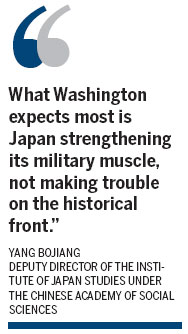Hagel calls on Tokyo to 'repair relations'
US Secretary of Defense Chuck Hagel has urged Tokyo to undertake damage control to lessen the Northeast Asia diplomatic deadlock in a telephone conversation with his Japanese counterpart, the Pentagon confirmed late on Saturday.
Washington has mixed feelings about Japan and gave Tokyo the New Year's advice to focus on military cooperation and not cause trouble on historical issues, observers said.
The phone conversation between the defense chiefs was scheduled for Dec 27 but was reportedly "canceled" after Japanese Prime Minister Shinzo Abe infuriated Asian neighbors by visiting a Tokyo shrine that honors 14 class-A war criminals from World War II the day before.
"Secretary Hagel underscored the importance of Japan taking steps to improve relations with its neighbors and to promote cooperation in advancing the shared goals of regional peace and stability," Pentagon press secretary John Kirby said in a statement.
Hagel's comments on the issue followed the US Embassy in Japan and US State Department's rare use of the word "disappointed" in commenting on Abe's shrine visit.
Teng Jianqun, a researcher at the China Institute of International Studies, said US President Barack Obama now seems to have mixed feelings about Abe, because "the US needs Japan, but it knows at the same time that it must not spoil Japan".

"Washington's publicly stated disappointment with Tokyo stems from the needs of the US rebalancing strategy in Asia-Pacific. ... Washington expected a closer relationship between South Korea and Japan, but Tokyo has done the contrary and brought Japanese-South Korean defense cooperation to a grinding halt," Teng said.
In the telephone call, Hagel also thanked the Japanese government for its efforts in securing approval from Okinawa's governor to relocate a US Marine Corps air base on the island, Kirby said.
"Secretary Hagel said he looked forward to continued bilateral discussions on strengthening the alliance to meet the security challenges of the 21st century," Kirby said.
Yang Bojiang, deputy director of the Institute of Japan Studies under the Chinese Academy of Social Sciences, said, in the current context, the US still needs a strong Japan to support its grand, multilayered strategy of seeking a counterbalance to China.
"In its future Japan policy, the US will have to place priority on Japan, but trust in the Abe cabinet will be shrinking and precautions are increasing," Yang said.
On Sunday, Japan's Nippon Television said there are "widespread concerns within the Japanese government" on whether the shrine visit will deteriorate the country's mutual trust with the United States.
Feng Wei, a professor of Japanese Studies at Fudan University in Shanghai, said "the founding pillars of the US-Japan alliance will not necessarily be damaged" despite the contradictions between them. "The alliance will be repaired and strengthened."
The two governments are arranging for Obama to visit Japan this April, and "efforts for maintaining mutual trust are underway" to address unsolved issues and push for Japan's early entry into the Trans-Pacific Partnership, Japan's NHK television said.
In an earlier written statement on Dec 27, Hagel mentioned both governments' work to review the US-Japan defense cooperation guidelines, which details the roles and cooperation of the Japanese and US forces in a potential crisis, by the end of 2014, Kyodo News Agency reported.
Feng, of Fudan University, said, "The basic strategic consideration for Obama is to secure stability in the Asia-Pacific region, and Washington will maintain its control over Abe's progress of shifting Japan's policies toward a right-wing style."
Yang predicted that if Japan makes more provocations toward China in 2014, most are likely to relate to territorial issues. "What Washington expects most is Japan strengthening its military muscle, not making trouble on the historical front," Yang said.
Contact the writer at zhangyunbi@chinadaily.com.cn
(China Daily 01/06/2014 page12)








